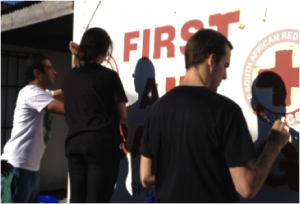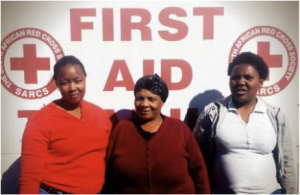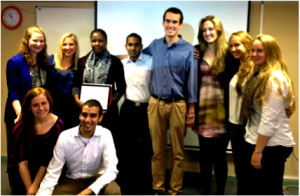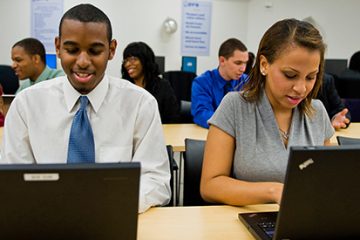In July of 2012, 40 students from the Social Enterprise Institute (SEI) traveled to Cape Town, South Africa, to consult with local micro-entrepreneurs and social enterprises under the tutelage of Professors Dennis Shaughnessy and Gordon Adomdza of the Entrepreneurship & Innovation Group at Northeastern University. SEI hosts interdisciplinary Northeastern students in Cape Town for their South Africa Field Study Program each July (Summer II).
On July 18, Nelson Mandela Day, students from SEI traveled to Nyanga, one of Cape Town’s oldest black townships, to volunteer with the South African Red Cross Society (SARCS). SARCS is a grassroots South African NPO and member of the International Red Cross that serves individuals living in townships and informal settlements throughout the Western Cape. SARCS’ work is focused primarily on health and disaster management given the extremely high prevalence of HIV/AIDS and frequency of both natural and man-made disasters in these disadvantaged communities.

Northeastern students volunteering at SARCS’ Health & Care center in Nyanga. Pictured: Khalid Aldabal, Patty Montesquieu and Sam Manning

Three SARCS volunteers in front of a sign painted by Northeastern students at the Health & Care center in Nyanga.

Students from SEI following their presentation to Seipati Nyelele of SARCS. Pictured: Renee Ross, McKenzie Freeman, Seipati Nyeyele, Sudip Rithik Datta, Sam Manning, Audrey Shaughnessy, Rachel Shaheen, Colleen Maney, Kelsey Duff, Khalid Aldab
Once back in the classroom, nine students from SEI were challenged by Professor Adomdza to find an innovative way to provide sustainable income for the women living with HIV/AIDS as well as the unemployed SARCS volunteers who serve them in Nyanga. Adomdza, whose course focuses primarily on business model innovation for social enterprises, guided the students throughout their research from which they discovered a remarkable opportunity.
Due largely to poor infrastructure and environmental degradation, electrical fires and flash floods are common within the townships and informal settlements of Cape Town. SARCS responds by distributing blankets to their victims, many of whom are displaced and rendered homeless by such disasters. SARCS buys these items from PEP, a large national retailer, and is later reimbursed by the South African government. The nine SEI students came to the following conclusion: instead of buying blankets from PEP, SARCS should use its government funding to employ its patients with HIV/AIDS as well as its unemployed volunteers to make the blankets themselves.
The students developed a cooperative business model whereby patients and volunteers are equally capable of benefiting from the sewing project regardless of the state of their health, i.e. their ability to engage in manual labor. In addition to stable employment, this innovative model provides patients and volunteers alike with the opportunity to save and take out emergency microloans by way of a SACCO housed within the sewing cooperative.
The students presented their concept before Professor Adomdza as well as Seipati Nyeyele of SARCS their last week in Cape Town. Both Adomdza and Nyeyele, extremely receptive of the idea, have secured funding to support the implementation of the project. The Social Enterprise Institute and Foschini, a South African clothing retailer, have co-financed a pilot scheduled for launch by the end of February. Through this pilot, SARCS will purchase blankets from approximately twenty patients and volunteers, providing them with the income they need to continue treatment, support their families, send their children to school and permanently lift themselves from poverty.
One of the nine Northeastern students, Sam Manning, has returned to Cape Town on co-op to assist SARCS with the implementation of the sewing cooperative. Manning has entered the project into the 2013 Dell Social Innovation Challenge, an annual competition dedicated to providing young social entrepreneurs with the startup capital they need to launch their innovations. To vote for the “Blanketing Unemployment” project, visit their profile on the Dell Social Innovation Challenge website here.


